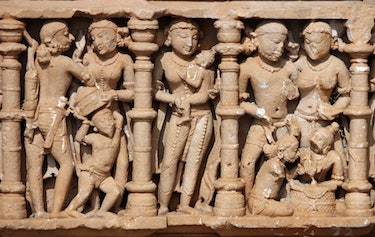 Simply put, anthropology is the study of what makes us human. If that seems broad, that’s because it is a broad field that can encompass the entire history of humanity, our present cultures, and communications, and the evolution of our biological makeup as we interact with a changing environment.
Simply put, anthropology is the study of what makes us human. If that seems broad, that’s because it is a broad field that can encompass the entire history of humanity, our present cultures, and communications, and the evolution of our biological makeup as we interact with a changing environment.
Anthropologists can be found under many titles across any industry that is related to human society—from governments to nonprofits, corporations, and business related to everything from retail to technology. If you’re interested in the strength of human diversity, applying research skills to collect data and improve programs and services, and gaining communication skills that could be applied across a wide field of specializations, then continue reading to learn about the possibilities of a path in anthropology.
THE CAREER PATH
One of the benefits of an educational background in anthropology is that it can lead to any path of your choosing, and professionals can change their mind as to which path they want to apply their skills in at any time. Even if you’re already working full-time and you want to change things up, or if you’re starting from scratch and want to work your way up—each career in anthropology can be shaped to suit your needs, strengths, and interests.
According to the Bureau of Labor Statistics’ Occupational Outlook Handbook (OOH), careers in anthropology can be divided into three main categories:
- Biological or Physical Anthropology is the study of the continuously changing nature of humans and our closely related primates.
- Cultural or Social Anthropology is the study of the social and cultural impact of many human-related issues and activities.
- Linguistic Anthropology is the study of the development of human communication and language.
Most of the time, individuals that aspire to become a professional anthropologist must be prepared to work towards at least a master’s degree that will provide them with the research skills, knowledge, and field experience to qualify for entry-level positions. Fortunately, it pays off: the average salary for anthropologists is more than $60,000. On the other hand, it is a competitive field that is expecting to see less than 5% growth in the coming decade.
Individuals with a bachelor’s degree may find that their skills can apply to a range of careers in human services and social sciences. Many professionals decide to pursue a career as a Museum Technician, also known as a registrar. Museum techs use their skills to facilitate the care and safeguarding of the objects in museum collections and exhibitions. Museum techs make just over $40,00 yearly on average and are expected to be in high demand in the coming years. Public interest in science, art, history, and technology is expected to spur some demand for museum technicians to inspire job growth of 12% by 2026.
WHO IS THE IDEAL CANDIDATE?
Being a competitive professional in anthropology requires a curious mind that is analytical and able to think critically to use scientific methods and draw thorough conclusions from their observations and research. It may not be a path for introverts, since all the careers in the field usually require good communication through writing, presenting, or collaborating.
It isn’t just a career that relies on the mind either; many research opportunities can require intensive physical activity like hiking, bending, and lifting. Physical stamina is a requirement for certain job positions. If you are an organized person who is excited about applying your critical thinking skills to answering questions about the history and current condition of humanity, then you may want to put on your thinking cap and consider your options for a career in anthropology!
WHAT SHOULD I LOOK FOR?
Most careers in anthropology require at least a master’s degree or a doctoral level of education. There may be some positions similar to anthropology, such as museum technicians, that are open to those with a bachelor’s degree.
Students in undergraduate programs can expect to cover subjects such as:
- Concepts and Methods of Anthropology
- Evolution and Behavior
- Human Biology
- Language and Culture
- The Human Brain
Many universities will offer online programs to get a Master of Art’s in Anthropology, which can take one to two years after undergraduate, or an alternative program to get a Doctorate of Philosophy in Anthropology, which can take around five years after undergraduate. The Master’s program is intended to give professionals a deeper understanding of Anthropology and prepare them for a Doctorate program and a professional career.
To be competitive in the job market, students may want to look into certifications that are unique to their specialized interests, such as forensic anthropology. Otherwise, there are no certifications or accreditation programs required for the field.
COST
The average cost of an online bachelor’s degree program is between $30,000 and $50,000. Explore programs that offer the best bang for your buck as you prepare for your career in anthropology.
